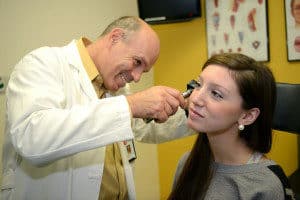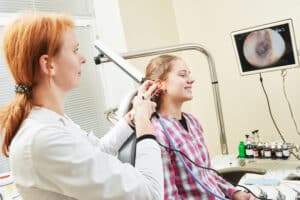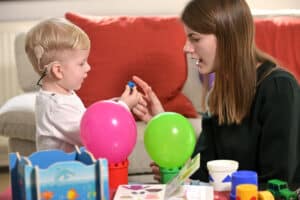Pediatric Hearing Loss

Hearing loss can be congenital or a result of external factors after birth. Our doctors at Pediatric ENT Associates in Birmingham work together with audiologists and speech therapists in order to get your child the comprehensive care they need after suffering from auditory damage of any kind. There are a variety of solutions available for helping children hear better, from hearing aids to cochlear implants to sign language. A thorough assessment and evaluation will determine which path is best for your toddler, and we at Pediatric ENT Associates are happy to accompany you every step of the way.
What Are the Signs of Hearing Loss in Babies?
In some cases, newborns who pass hearing screenings in the first few days after birth may still exhibit signs of hearing loss as they get older. It is therefore important to continue monitoring for signs of hearing loss by being aware of certain hearing milestones that your child must reach in the first year of life:
- Newborns startle in reaction to sudden loud noises
- By 3 months, infants usually are already able to recognize a parent’s voice
- By 6 months, babies can turn their heads or eyes toward a sound they hear
- By 12 months, babies can usually mimic some sounds or attempt to say a few words such as “mama”
What Are the Signs of Hearing Loss in Children?
Older children may develop hearing loss without showing any previous signs when they were younger. Signs that your toddler might have hearing loss include:
- Difficulty in understanding what other people are saying
- Speaking differently than other children his or her age
- Does not reply when his or her name is called
- Complains of earaches
- Has limited or no speech
- Misunderstands questions and responds incorrectly
- Sits close to the TV or turns up the volume to an unusually high level
- Difficulty in learning or starting to have problems academically
- Shows signs of behavioral problems or social difficulties
- Shows delay in speech and language
- Closely watches others in order to imitate their actions or watches a speaker’s voice intently to lip read
- Frequently inattentive
- Easily frustrated and experiences frequent communication breakdowns
What Causes Hearing Loss in Children?
Congenital
Congenital hearing loss is when the loss is present from birth. Genetics are generally the primary factor in this type of loss. If one or both parents carry a dominant hearing loss gene, the chances are high that it will be passed on to the child. If one or both parents carry a recessive gene, the chances are smaller but still there. In some cases, the mother may pass on a recessive gene to male children but not females.
Hearing loss in one ear is a trait associated with some hereditary syndromes, as well. Down syndrome, Usher syndrome, and Alport syndrome are a few conditions that carry the condition as a symptom.
Non-hereditary factors that may contribute to congenital hearing loss include prenatal infections, prematurity, illnesses, toxins consumed by the mother during pregnancy, and other conditions that may have occurred at the time of birth. Examples of conditions that can cause hearing loss, which can be mild to profound in degree, include:
- Maternal diabetes
- Intrauterine infections (e.g., rubella, herpes simplex virus, cytomegalovirus)
- Complications associated with the Rh factor in the blood
- Lack of oxygen (anoxia)
- Drug or alcohol abuse by the mother or smoking during pregnancy

Non-Congenital
One of the main causes of non-congenital hearing loss in children in Birmingham is otitis media or inflammation of the middle ear. Otitis media is usually associated with fluid buildup behind the eardrum due to undeveloped Eustachian tubes.
The Eustachian tubes link the ear with the throat, but in young children, they have not fully formed yet and can contribute to fluid buildup due to not being able to drain properly. This fluid buildup can cause temporary loss of the ability to hear well, and if the infections become chronic, it can lead to permanent sensorineural hearing loss.
Other non-congenital causes can result from various factors. It can be caused by a perforated eardrum, taking medications linked to hearing loss, untreated or frequent ear infections, and exposure to secondhand smoke or other toxins. Certain conditions and illnesses can also lead to acquired hearing loss in children. Examples include:
- Measles
- Influenza
- Mumps
- Meningitis
- Chicken pox
- Encephalitis
Loss of auditory capabilities can also result from overexposure to loud noise or a serious trauma to the head. No matter the cause, if you suspect your toddler may be suffering hearing loss in one ear, it’s important to take them to an experienced pediatric ENT specialist for evaluation.
How Do You Manage Hearing Loss in Children?
Signs of hearing loss in a child in Birmingham can be devastating for a family. Luckily, there are many ways to manage these conditions of differing severities. The expert ENT specialists at Pediatric ENT Associates are at the forefront of cutting-edge technology that can help your toddler to hear better and live a relatively normal life.
Hearing Aids
Children with auditory damage that is not too severe may benefit from being fitted with an external hearing aid. Hearing aids amplify sound so that children who have challenges will be better able to hear. Aids can be worn from a very young age in order to accommodate and facilitate speech and hearing. The earlier a toddler is able to hear well, the faster they will be able to pick up speech and language abilities.
There are a variety of styles of hearing aids, so it is important to consult with your pediatrician and audiologist in order to obtain the best type for your child. As your toddler grows, the aid will need to be changed periodically to continue to fit your child’s ear. Settings may be changed as well, if there are any changes to your child’s hearing.
To learn more about hearing loss treatment, child and baby ear infection treatment options and disorders, visit medlineplus.gov.
Cochlear Implants

Cochlear implants are an advanced technology that allow for profoundly and severely deaf children with bilateral sensorineural hearing loss to hear again. Cochlear implants are not a hearing aid; they are a two-part surgical implant that allows your toddler to process sound. The two parts to a cochlear implant are external and internal. Surgery is needed to implant an electronic device into the cochlea, which is used to transmit signals sent from the external microphone to the brain.
Cochlear implants are a commitment. Regular follow-ups are necessary after surgery, as well as speech therapy and regular audio and language evaluations. If parents in Birmingham are willing to make the commitment, however, the decision to get a cochlear implant as a hearing loss treatment option can be life-changing.
Schedule a Hearing Evaluation with an ENT Specialist in Birmingham, AL
If you suspect your toddler may be losing their hearing, please do not hesitate to make an appointment to have them evaluated. It is vital to catch auditory difficulties as early as possible so that your child doesn’t miss out on speech and language development. You can make an appointment with Pediatric ENT Associates in Birmingham by contacting us at (205) 831-0101 for hearing loss treatment options.
